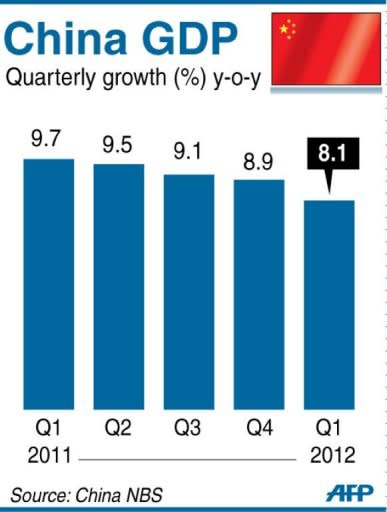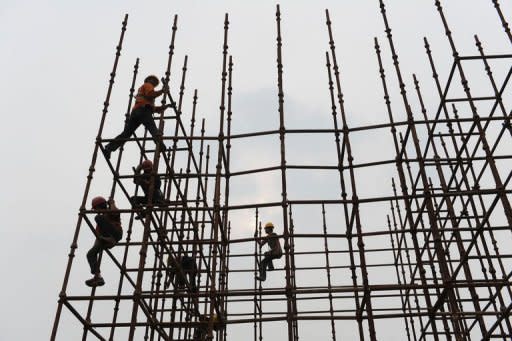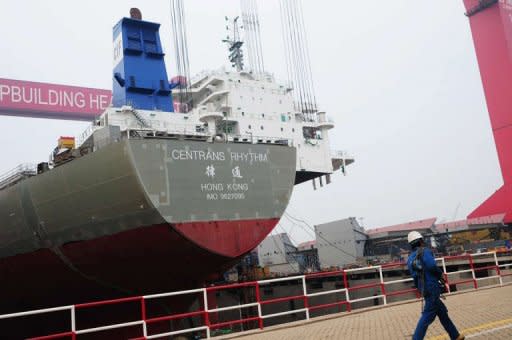China's Q1 growth slowest in nearly three years
China said on Friday its economy grew by 8.1 percent in the first three months of 2012, its slowest pace in nearly three years, but analysts forecast a pick-up in the second half of 2012. The figure was well below the 8.9 percent growth recorded in the last quarter of 2011 and marked the fifth consecutive quarterly slowdown, piling further pressure on Beijing to loosen its monetary policy. However, analysts predicted the world's second-largest economy would avoid a hard landing, with growth expected to rebound towards the end of the year as Europe's economic outlook brightens and existing loosening measures kick in. "Green shoots have sprung up in many sectors, convincing us that the current slowdown looks more and more like a slow consolidation, rather than a precipitous downturn like we saw in 2008-09," said Xianfang Ren, economist with IHS Global Insight. The first quarter "might turn out to be the weakest quarter for China in the current down cycle, as signs of stabilisation have already emerged on both domestic and external demand sides". Further evidence of a slowdown in China's export-driven economy came with data showing output from its millions of factories and workshops rose at a much slower pace in the first three months of this year. Industrial output was up 11.6 percent in the first quarter, compared with growth of 15.7 percent a year earlier, the National Bureau of Statistics (NBS) said. Spokesman Sheng Laiyun said there was now "enormous" pressure on exports as China's vast manufacturing sector is hit by falling demand for in crisis-hit Europe, the country's main export market. "The global situation in the first quarter is complex... the pressure on exports growth is enormous," he told reporters. Over the past few months Beijing has pledged to "fine-tune" policy to prevent a hard landing for the economy, which could trigger widespread job losses and spark social unrest. China's annual growth slowed to 9.2 percent last year from 10.4 percent in 2010, prompting the government to cut its economic growth target to 7.5 percent this year, in an official acknowledgement that the export-driven economy is slowing. The government has also introduced a string of measures to help its struggling small businesses and pledged to support its export sector. The central bank in February cut the amount of cash banks must hold in reserve for the second time in three months as policymakers moved to increase lending and boost domestic consumption. "More policy easing will be needed to sustain growth and to facilitate a less painful deceleration", said Yao Wei, an economist with Societe Generale, which expects two further cuts in the reserve requirement ratio in the coming months. Data on Thursday showed the effects of China's easing monetary policy seem to be seeping through as banks ramped up lending in March by issuing 1.01 trillion yuan ($160.3 billion) in new loans, a big jump from the 710.7 billion yuan issued in February. And retail sales, the main gauge of consumer spending, rebounded slightly last month to 15.1 percent. "The worst is over. The first quarter will be the trough of this cycle. Policy stance will remain pro-growth, but don't expect big stimulus," said Bank of America Merrill Lynch, in a note to clients. Despite a slight rebound in March, inflation has also eased significantly, leaving more room for Beijing to support growth. Fixed-asset investment slowed to 20.9 percent year-on-year in the first quarter, pulling back quite significantly from last year's nearly 24 percent growth and reflecting slower housing and infrastructure construction. Last year Beijing imposed stringent measures on the real estate sector with the aim of curbing prices, which more than doubled in many cities between 2009 and 2010. China's housing prices have been falling steadily for the past few months with effects spilling over to other sectors of the economy including cement, steel and construction and analysts say negative impact on growth will continue. Shares in Hong Kong and China rose on Friday, as the market widely expects fresh monetary easing by Beijing. Hong Kong shares rose 1.84 percent on Friday and closed up 0.35 pct in China.





